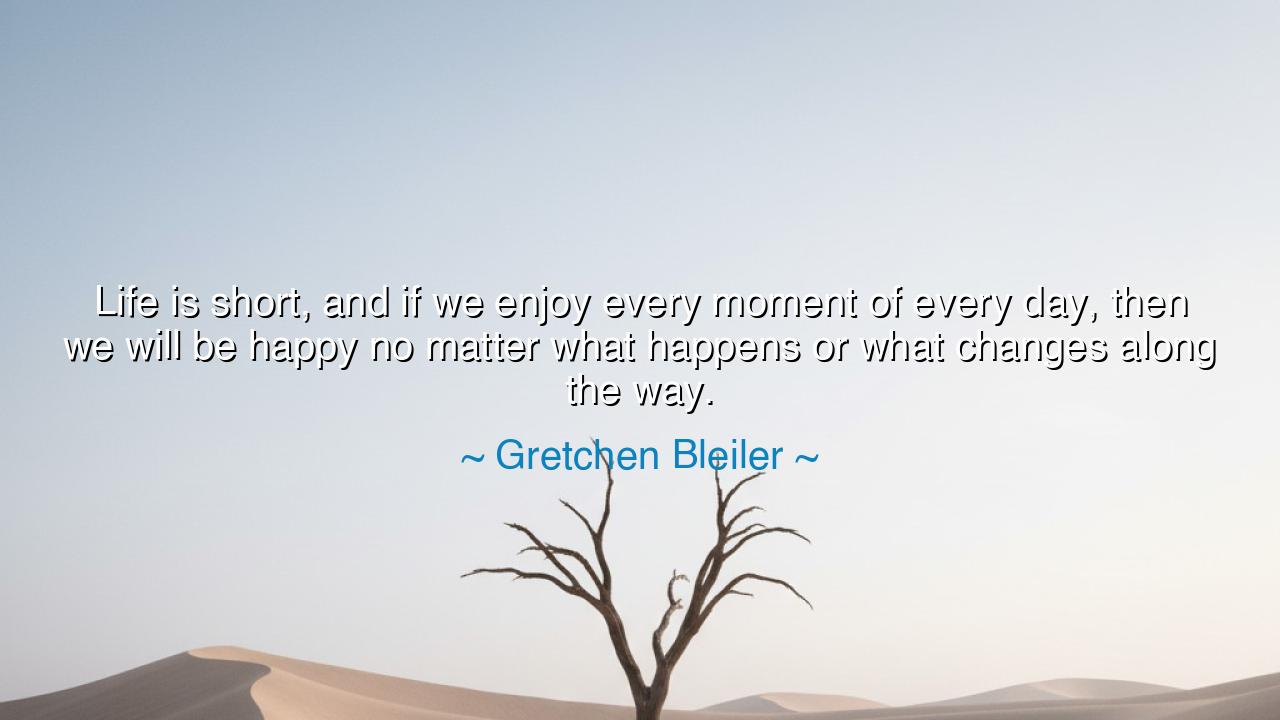
Life is short, and if we enjoy every moment of every day, then we
Life is short, and if we enjoy every moment of every day, then we will be happy no matter what happens or what changes along the way.






"Life is short, and if we enjoy every moment of every day, then we will be happy no matter what happens or what changes along the way." These words, spoken by Gretchen Bleiler, carry the weight of profound wisdom about the fleeting nature of life and the power of presence. In a world that constantly urges us to seek more, achieve more, and move faster, Bleiler reminds us of the beauty in simplicity—in fully embracing the moments we are given, rather than constantly yearning for what is to come or regretting what has passed. The essence of her message is that happiness is not found in future pursuits or past accomplishments, but in how we engage with the present.
The ancients were well aware of the fleeting nature of life. Heraclitus, the great Greek philosopher, spoke of the ever-changing nature of existence, famously declaring that "you cannot step into the same river twice." He recognized that life is in constant flux, and that to find peace and joy, one must accept this transience and live fully in the moment. The Stoics, too, taught that our happiness does not depend on external circumstances, but on our own ability to control our reactions to life’s inevitable changes. Marcus Aurelius, the Roman emperor and philosopher, believed that if we approach each day with gratitude and awareness, we could find meaning and fulfillment in even the most challenging of circumstances.
Consider the life of Socrates, who lived in the pursuit of wisdom and virtue, never looking forward to some grand reward, but finding joy in the pursuit of knowledge itself. His life was marked not by wealth or status, but by his constant engagement with the present moment, as he questioned, learned, and sought truth. Even in his final moments, when faced with death, Socrates remained calm and at peace, teaching his disciples about the importance of accepting life and death with grace. His commitment to living fully in each moment exemplifies the core of Bleiler’s words: true happiness comes from how we live, not from what we attain or avoid.
In more recent history, Viktor Frankl, a Holocaust survivor and psychiatrist, offered a similar insight in his work Man's Search for Meaning. Frankl, despite the unimaginable suffering he endured in concentration camps, found that his happiness and sense of purpose were not determined by external events but by his attitude and his ability to choose his response to those events. Frankl’s discovery was that, no matter how difficult life may become, we can still find meaning and contentment in the present moment, by focusing on our actions and our mental state. This, in essence, is the message of Bleiler’s quote—by embracing life as it is, without waiting for some future goal to bring us joy, we unlock the power to be happy regardless of the circumstances.
The lesson from Gretchen Bleiler’s reflection is simple yet profound: life is fleeting, and our happiness is not found in distant hopes or past regrets but in the fullness of the present. The more we practice living in the moment—free from the burdens of future expectations and past mistakes—the more we come to realize that happiness is not an end to be achieved but a state of being to be cultivated. Each moment, no matter how ordinary, holds the potential for joy, if we are willing to engage fully with it.
In our own lives, we can take inspiration from these ancient and modern teachings by focusing on the present moment. We often become so consumed with future plans or past disappointments that we forget to enjoy the simple pleasures around us: the warmth of the sun on our skin, the sound of laughter from a loved one, the comfort of a quiet evening. Let us train ourselves to be more present, to savor the little moments that make up our days, and to find peace and happiness not in the destination but in the journey itself.
So, let us live fully in the present, embracing each moment with gratitude and awareness. Let us take pleasure in the simple joys of life, recognizing that happiness is not a future reward but a present choice. Whether we are facing challenges or enjoying success, the ability to be content in the now is the key to enduring peace. Like Socrates, Frankl, and others who have faced the most difficult circumstances with grace, we can find true fulfillment by engaging with life as it is, living each moment with purpose and joy.






AAdministratorAdministrator
Welcome, honored guests. Please leave a comment, we will respond soon